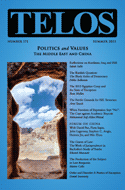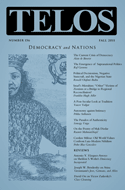 The Kurdish Question is a continuation of violence, protest, and repression that persist from the unfinished national state-building of the early twentieth-century Europe. This article compares it with similar but more successful ones in the Nordic countries. The Kurdish Question depends on the democratization of Turkish society. There are black holes on both sides of the conflict that absorb efforts to build democratic institutions. Enlightenment critique of absolutism in Europe established the supremacy of the social over the political order. The republic represents the will of the people. Koselleck argued that this idea potentially drifts towards totalitarianism and brutalities: those who do not obey are excluded to the point of losing their human worth. This is the heart of the Kurdish Question in Turkey today. In democracy different groups defend their interests in political movements that attempt to rule by law. In the Kurdish Question negotiable interests have been identified and reforms are on the way. The problem is that symbolic black holes absorb efforts to negotiate into the requirement of unity and consequent inability to deal with difference. On the Turkish side, the unity is imposed by the secular and modern nationalism itself. On the Kurdish side it consists of a silence about differences in the Kurd society, which is still largely tribal but with a large population outside the clan system.
The Kurdish Question is a continuation of violence, protest, and repression that persist from the unfinished national state-building of the early twentieth-century Europe. This article compares it with similar but more successful ones in the Nordic countries. The Kurdish Question depends on the democratization of Turkish society. There are black holes on both sides of the conflict that absorb efforts to build democratic institutions. Enlightenment critique of absolutism in Europe established the supremacy of the social over the political order. The republic represents the will of the people. Koselleck argued that this idea potentially drifts towards totalitarianism and brutalities: those who do not obey are excluded to the point of losing their human worth. This is the heart of the Kurdish Question in Turkey today. In democracy different groups defend their interests in political movements that attempt to rule by law. In the Kurdish Question negotiable interests have been identified and reforms are on the way. The problem is that symbolic black holes absorb efforts to negotiate into the requirement of unity and consequent inability to deal with difference. On the Turkish side, the unity is imposed by the secular and modern nationalism itself. On the Kurdish side it consists of a silence about differences in the Kurd society, which is still largely tribal but with a large population outside the clan system.
|
Pekka Sulkunen’s “Autonomy against Intimacy: On the Problem of Governing Lifestyle-Related Risks” appears in Telos 156 (Fall 2011). Read the full version online at the TELOS Online website, or purchase a print copy of the issue here. |
||||
|
Telos Press Publishing · PO Box 811 · Candor, NY 13743 · Phone: 212-228-6479 Privacy Policy · Data Protection Copyright © 2025 Telos Press Publishing · All Rights Reserved |
||||
 Most risk society analyses focus on external risks caused by production, neglecting internal risks produced by consumption. Tobacco, alcohol, obesity, lack of exercise, and other lifestyle-related causes are top global burdens of health, growing with emerging consumer society outside western capitalism. Modern societies have a poor track record in regulating these risks. Neo-liberal hegemony is a weak explanation of the failure. We must see the issue as a problem of justification. Modern social order is founded on individual biography, autonomy, and intimacy as principles of human worth. The twentieth-century modern state has guided the progress to make these ideals reality. Autonomy, the right to individual self-control, has supported the right to intimacy, experience of life as unique and separate from other lives. Today, only quite recently, these principles of worth are fully matured, but autonomy and intimacy are now conflicting. One person’s uniqueness—the pleasure of consumption or cultural identity—is felt to tax the autonomy of others. Vice versa, the autonomy of the majority cuts into the uniqueness of the few. The state has lost its pastoral role to lead the flock to progress, and become apostolic authority merely instructing the faithful on health, security, and well-being from a distance.
Most risk society analyses focus on external risks caused by production, neglecting internal risks produced by consumption. Tobacco, alcohol, obesity, lack of exercise, and other lifestyle-related causes are top global burdens of health, growing with emerging consumer society outside western capitalism. Modern societies have a poor track record in regulating these risks. Neo-liberal hegemony is a weak explanation of the failure. We must see the issue as a problem of justification. Modern social order is founded on individual biography, autonomy, and intimacy as principles of human worth. The twentieth-century modern state has guided the progress to make these ideals reality. Autonomy, the right to individual self-control, has supported the right to intimacy, experience of life as unique and separate from other lives. Today, only quite recently, these principles of worth are fully matured, but autonomy and intimacy are now conflicting. One person’s uniqueness—the pleasure of consumption or cultural identity—is felt to tax the autonomy of others. Vice versa, the autonomy of the majority cuts into the uniqueness of the few. The state has lost its pastoral role to lead the flock to progress, and become apostolic authority merely instructing the faithful on health, security, and well-being from a distance. 

